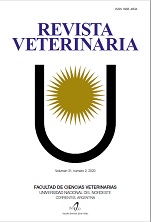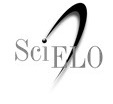Effect of different iron application protocols on hematological variables in piglets
DOI:
https://doi.org/10.30972/vet.3124733Keywords:
piglets, anemia, iron dextran, hematological variablesAbstract
The objective of this research work was to evaluate the effect of different iron administration protocols in the prevention of anemia in piglets through hematological variables such as red blood cell count (RBC), hemoglobin (HB), hematocrit (HTO), erythrocyte indexes (VCM, CHM, CHCM), ferritin (FT) and transferrin (TF). The study was conducted at the Uyumbicho Experimental Center, Pichincha (Ecuador), using a total of 27 piglets (Landrace x Yorkshire x Pietrain) distributed in a completely randomized design in three treatments (T). T1 was applied iron dextran (100 mg/ ml), at a single dose of 2 ml on the third day of age; T2 iron dextran (100 mg/ml), 1 ml at day 3 and 7 of age; T3 iron dextran (200 mg/ml), 1 ml at day 3 of age. Additionally, the body weight was evaluated at 28 days of age (weaning). Blood samples were taken 4 days after application. Difference (p<0.05) was found between the treatments for the variables RBC, HB and HTO, presenting higher values in piglets of the T2 group. Erythrocyte index, FT and TF, showed no difference (p>0.05). Regarding body weight, there was no difference between the groups evaluated (p>0.05). From this work it is concluded that the application of two doses of iron dextran (100 mg/dl) at days 3 and 7 of age, was more effective in preventing anemia as reflected in the values of red blood cells, hemoglobin and hematocrit. The body weight of the piglet was not favored by any of the treatments applied.Downloads
References
Almond G, Byers E, Seate J, Boyer P. 2017. Supplemental iron dextran injections: Influence on hemoglobin concentrations and piglet growth. J Swine Health Prod 25: 308-312.
Amine EK, Neff R, Hegsted DM. 1972. Biological estimation of available iron using chicks or rats. J Agr Food Chem 20: 246-251.
Bhattarai S, Nielsen JP. 2015. Association between hematological status at weaning and weight gain post-weaning in piglets. Livest Sci 182: 64-68.
Braude R, Chamberlain AG, Kotarbinska M, Mitchell KG. 1962. The metabolism of iron in piglets given labelled iron either orally or by injection. Br J Nutr 16: 427-449.
Calvo JJ, Allue JR. 1986. Plasma ferritin and other parameters related to iron metabolism in piglets. Comp Biochem Physiol 85: 471–476.
Carr J. 2014. Guía práctica para el manejo del ganado porcino, 1ra ed., Servet Ed., Zaragoza, p. 16.
Ducsay CA, Buhi WC, Bazer FW, Roberts RM, Combs GE. 1984. Role of uteroferrin in placental iron transport: effect of maternal iron treatment on fetal iron and utero ferrin content and neonatal hemoglobin. J Anim Sci 59: 1303-1308.
Furugouri K, Miyata Y, Shijimaya K, Narasaki N. 1983. Developmental changes in serum ferritin of piglets. J Dairy Sci 67: 1256–1263.
Ishaya V, Ishaya M. 2012. Iron nutrition and anaemia in piglets: a review. J Vet Adv 2: 261-265.
Jackson P, Cockcroft P. 2009. Manual de medicina porcina, 1era ed., Editorial Inter-Médica, Buenos Aires, p. 230-232.
Jolliff JS, Mahan DC. 2011. Effect of injected and dietary iron in young pigs on blood hematology and postnatal pig growth performance. J Anim Sci 89: 4068-4080.
Lee SH et al. Effects of dietary iron levels on growth performance, hematological status, liver mineral concentration, fecal microflora, and diarrhea incidence in weanling pigs. Biol Trace Elem Res 126: 57-68.
Lewis AJ, Southern LL. 2000. Swine nutrition, 2nd ed., CRC press, New York. p. 251-254.
Li Y et al. 2018. Effect of different sources and levels of iron in the diet of sows on iron status in neonatal pigs. Anim Nutrit 4: 197-202.
Lipinski P et al. 2010. Benefits and risks of iron supplementation in anemic neonatal pigs. Br J Psychiatry 111:
-1010.
McDowell LR. 2003. Minerals in animal and human nutrition, 2nd. ed., p. 206-232, Elsevier Publisher, Florida, 660 p.
National Research Council. 2012. Nutrient requirements of swine, 11th ed., National Academic Press, Washington DC, p. 84-85.
Perri AM, Friendship RM, Harding JC, O’Sullivan TL. 2016. An investigation of iron deficiency and anemia in piglets and the effect of iron status at weaning on postweaning performance. J Swine Health Prod 24: 10-20.
Peters JC, Mahan DC. 2008. Effects of neonatal iron status, iron injections at birth, and weaning in young pigs from sows fed either organic or inorganic trace minerals. J Anim Sci 86: 2261-2269.
Pu Y et al. 2018. Iron promotes intestinal development in
neonatal piglets. Nutrients 10: 1-11.
Ranjan R, Prasad CM, Singh SK. 2012. Effect of iron dextran injection on growth performance of crossbred and desi piglets under farm and village conditions. Vet World 5: 599-602.
Smith J, Moore K, Boyington D. 1983. Enzyme immunoassay for serum ferritin of pigs. Biochem Med 29: 293-297.
Starzynski RR et al. 2013. Iron supplementation in suckling piglets: How to correct iron deficiency anemia without affecting plasma hepcidin levels. PLoS ONE 8: e64022.
Svoboda M, Ficek R, Drábek J. 2008. Reticulocyte indices in the diagnosis of iron deficiency in suckling piglets. B Vet I Pulawy 52: 125-130.
Svoboda M, Vaňhara J, Berliska J. 2017. Parenteral iron
administration in suckling piglets, a review. Acta Vet Brno 86: 249-261.
Szudzik M et al. 2018. Iron supplementation in suckling piglets: An ostensibly easy therapy of neonatal iron deficiency anemia. J Pharm 11: 128.
Thorén K. 1984. Studies of serum-transferrin and some hematologic parameters in vitamin E and selenium deficient pigs. Ann Rech Vet 15: 387-394.
Valenzuela C, Antileo R, Lagos G, Pizarro F. 2015. El cerdo como modelo experimental para la nutrición de hierro. Rev Chil Nutr 42: 191-198.
Venn JA, McCance RA, Widdowson EM. 1947. Iron metabolism in piglet anaemia. J Comp Pathol 57: 314-325.
Ventrella D et al. 2017. The biomedical piglet: Establishing reference intervals for haematology and clinical chemistry parameters of two age groups with and without iron
supplementation. BMC Vet Res 13: 1-8.
Downloads
Published
How to Cite
Issue
Section
License
Copyright (c) 2021 R. E. Anchapanta, J. R. Quisirumbay, M. A. Naranjo

This work is licensed under a Creative Commons Attribution-NonCommercial 4.0 International License.
Revista Veterinaria (Rev. Vet.) maintains a commitment to the policies of Open Access to scientific information, as it considers that both scientific publications as well as research investigations funded by public resources should circulate freely without restrictions. Revista Veterinaria (Rev. Vet.) ratifies the Open Access model in which scientific publications are made freely available at no cost online.











.jpg)
.jpg)



